

Stacey Dooley Investigates: Are your clothes wrecking the planet? - BBC Three. INSIGHT-China's 'infrastructure for minerals' deal gets reality-check in Congo. Revisiting Chinese neocolonialism. The debate about Chinese neocolonialism is long standing but has re-emerged with new force for two reasons.
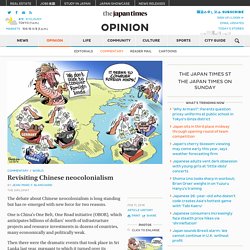
One is China’s One Belt, One Road initiative (OBOR), which anticipates billions of dollars’ worth of infrastructure projects and resource investments in dozens of countries, many economically and politically weak. Then there were the dramatic events that took place in Sri Lanka last year, pursuant to which it turned over its Hambantota port and a massive amount of land in Colombo port to Chinese multinational corporations (MNCs) in return for debt relief. To top it off, we are seeing Chinese military bases (in Djibouti) and security “advisers” (in Pakistan) in places where China has strong economic interests. Indeed, the general features of China’s relations with many countries today bear close resemblance to the European colonial powers’ relations with African and Middle Eastern countries in the 19th and 20th century.
Critics offer several counterarguments. Territorial Claims of the Antarctic. UK 'disappointed' by Bombardier tax ruling. Image copyright Reuters.
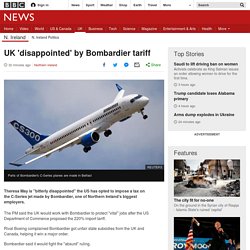
Why is Bombardier and its C-Series important to NI? Image copyright Pacemaker The C-Series passenger plane is a big part of Bombardier's operations in Belfast.

About a quarter of the workforce - 1,000 people - are involved with the aircraft. The vast majority are engaged in wing-making at a purpose-built factory at Queen's Island. The £520m facility was opened by former Prime Minister David Cameron in 2013. The factory and associated wing research projects have had grants and a loan totalling £134m. The fortunes of the C-Series and, by extension, Bombardier itself are seen as being hugely important to the local economy.
The company is Northern Ireland's largest manufacturing employer, with 4,100 staff based in and around Belfast. Their wages, according to accounts, put £158m into the economy annually. But many other jobs are supported beyond the Bombardier factory gates. About 15 engineering firms in Northern Ireland are major suppliers of parts for the C-Series. Threat to retaliate. Your new iPhone’s features include oppression, inequality – and vast profit. Arctic nations square up as clamour for resources grows. Kristian Jensen, Denmark’s foreign minister, gave a precise response last week to a request by Russia for the nations to enter bilateral talks over the ownership of the north pole.
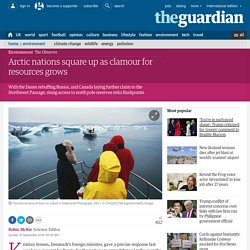
He flatly rejected the move. “We need to apply the international rules,” he told reporters. The Russian request and the swift Danish response are intriguing. The United Nations is currently assessing Russian, Danish and Canadian claims to own sizeable chunks of the Arctic seabed. The Russian move was generally viewed as an attempt to strike a deal that would cut out Canada, while Denmark appears to believe its case is strong enough to exclude such manoeuvres. One thing is clear. Letters: Icy imperialism or reinforcement of the Antarctic treaty? How economics became a religion. Although England has an established church, few of us today pay it much mind.
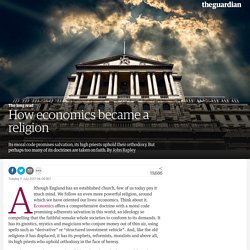
Globalization and Growth - The New York Times. Globalisation: the rise and fall of an idea that swept the world. Global Trade. Log In. Our industrialized food system nourishes more people, at lower cost, than any comparable system in history.
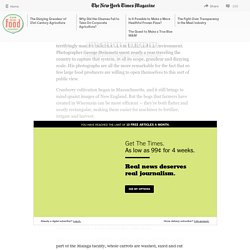
It also exerts a terrifyingly massive influence on our health and our environment. Photographer George Steinmetz spent nearly a year traveling the country to capture that system, in all its scope, grandeur and dizzying scale. His photographs are all the more remarkable for the fact that so few large food producers are willing to open themselves to this sort of public view. How We Share the World. This interactive graphic shows how the world is divided according to six different socioeconomic variables.
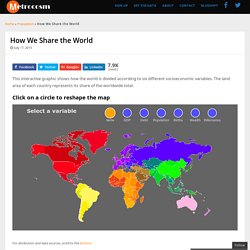
The land area of each country represents its share of the worldwide total. Click on a circle to reshape the map For attribution and data sources, scroll to the bottom. I have been having fun experimenting with cartograms lately. As maps go, they have their shortcomings. For more information about what a cartogram is, have a look at my last two posts, The Housing Value of Every County in the U.S. and A Striking Perspective on New York City Property Values. For this map, I looked at several different socioeconomic variables to include. The GDP-scaled map makes it clear how dominant the U.S. economy is. Government Debt Looking at the world scaled by government debt, the first thing that jumps out is Japan. Population / Births.
These Charts Show How Globalization Has Gone Digital. Since last November, when the English singer Adele posted a track from her latest album, 25, on YouTube, she has sold more than 15 million downloads worldwide.
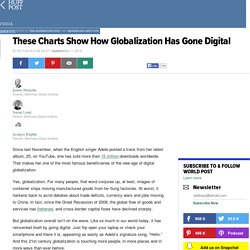
Trump withdraws from Trans-Pacific Partnership amid flurry of orders. Donald Trump has begun his effort to dismantle Barack Obama’s legacy, formally scrapping a flagship trade deal with 11 countries in the Pacific rim.
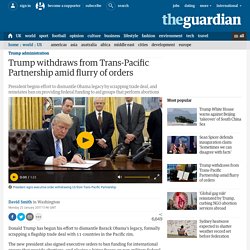
The new president also signed executive orders to ban funding for international groups that provide abortions, and placing a hiring freeze on non-military federal workers. Trump’s decision not to join the Trans-Pacific Partnership (TPP) came as little surprise. During his election campaign he railed against international trade deals, blaming them for job losses and focusing anger in the industrial heartland. Obama had argued that this deal would provide an effective counterweight to China in the region. “Everyone knows what that means, right?” The TPP was never ratified by the Republican-controlled Congress, but several Asian leaders had invested substantial political capital in it. Globalisation has made the world a better place.
I was recently in beautiful Chile for a Futures Congress, and I had a chance to travel south to the very tip of Latin America.
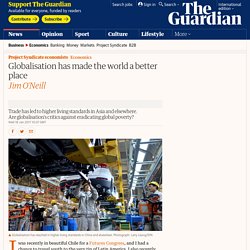
I also recently made a BBC radio documentary called Fixing Globalisation, in which I criss-crossed the UK in search of ideas for improving certain aspects of it and discussed topical issues with well-known experts. In both cases, I saw things that convinced me that it is past time for someone to come to globalisation’s defence. Chile today is Latin America’s richest country, with per capita GDP of about $23,000 – similar to that of central European countries. Globalisation once made the world go around. Is it about to grind to a halt? His speech was like one normally expected of an American president. Countries must resist the temptation to retreat into harbour, the world leader said to a packed and admiring audience, but instead have the courage to swim in the vast ocean of the global market. This was the kind of paean to free trade that might have come from John F Kennedy, George W Bush or Bill Clinton – all occupants of the White House who saw it as the United States’s role to defend the open international trading system set up at the end of the second world war.
This, though, was China’s president, Xi Jinping, in Davos last week, making it clear that he was prepared to fill the vacuum if Donald Trump went ahead with the sort of protectionist policies he had proposed in his election campaign. TheWorldIsFlat.